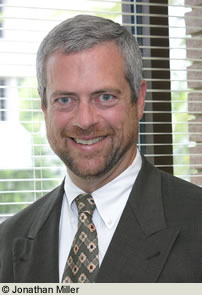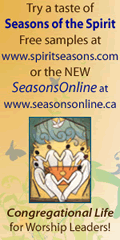Vol 8 Issue 1SectionsPriorities This IssuePrioritiesAfter Easter: Hope, and Happy Birthday!>> Extended Interview with Rev. Dr. Michael Kinnamon>> The Text, Webster, and Intuition>> TransitionsAnother Really Big Fish Story>> TraditionsEaster, Hope, and “Happy Birthday!”>> “Children, Have You Any Fish?”>> Wisdom & WonderingI am going out to fish>>
|
ArchiveAn Interview with Rabbi Jonathan Miller, Temple Emanu-El 
Janine: Jonathan, thank you so much for granting me this interview. I laugh when I remember walking into Temple Emanu-El. I must have even looked confused, for this kind gentleman took pity upon me and directed me upstairs to your office. I was tip-toeing around; the Temple has that effect upon me. In an earlier conversation, you mentioned the high holy day of Yom Kippur versus the simpler celebration of Hanukkah. Will you please tell us something about these traditions and the other holidays of the Jewish calendar? Jonathan: The Jewish calendar has an autumn and springtime ebb and flow. In the autumn, we begin with our preparations for the season of renewal and judgment and forgiveness. Rosh Hashanah celebrates the creation of the world and the judgment of the soul. Ten days later we observe Yom Kippur, our day of atonement. This is a day of fasting, introspection, and repentance. We spend the entire day in prayer. This somber day is followed five days later by our thanksgiving festival, the eight-day Festival of Booths. We build huts outside and eat our meals in them. Then we conclude with Simchat Torah, where we conclude the Torah with the death of Moses, and in the same service start immediately again with the start of Genesis. The cycles: renewal of the earth, the soul, nature, and the Torah. It is a busy and heady time. In the springtime, we observe Purim, Passover and Shavuot, which span a few months. This cycle focuses us on our people’s experience in history. We were saved from the evil Haman, and from Pharaoh, and then we stood at Mount Sinai to receive God’s word. We have other holidays during the winter and summer, but they, including Hanukkah, are not major. Hanukkah is a lovely holiday that has captured our imagination because of its proximity to Christmas. But this is not a major holy day for us, even as it is a lovely holiday. Janine: What is the process for becoming a rabbi? What was that like for you? What do you love most about being rabbi? Jonathan: Rabbi means teacher. We are not “called” per se, but the rabbinate is certainly a calling. In much the same vein as the Christian clergy; we teach, preach, counsel, and officiate at life cycle events. We lead in the community. We are the CRO’s, the Chief Rabbinic Officers of our congregations. I love every one of my tasks. The most exciting and the most challenging part of the congregational rabbinate is knowing that no day is like the previous day. Each day has its surprises. Sometimes there are too many surprises, but no day is dull. And we are privileged to work with people and accompany them through their lives. I believe that God thanks us for that. Janine: Tell us about your community involvement. What “speaks the most” to your heart in that work? Jonathan: People lead such busy lives, and the world becomes smaller and smaller, and we tend to collide with each other. We need to find ways to speak to each other and get to know each other. We are all dependent upon each other for our wellness. No group can stand alone. We also must expect mutual respect and caring from our community partners. The rise in violence and the threat of terrorism needs to be countered by people of good will. Never should we try to explain away or justify hatred. I also have a great love and tenderness for the State of Israel. After the Shoah (Holocaust), Israel is the first sign of our redemption. Israel deserves to live in peace, like any other nation. And I hope too for the Palestinian people. I hope that they will turn from their extremism and embrace people of good will. We talk too much about destruction and not enough about building. Janine: You mentioned your family. Will you share a little about them? Jonathan: I have enjoyed 31 years of marriage. My wife, Judi, is a psychotherapist and an instructor for physicians. She works in private practice and is a wonderful marriage therapist. My elder son was just married in June and is studying for the rabbinate. He and his new wife are in Jerusalem for the year. My daughter is a junior at Wesleyan University, concentrating in two different fields, economics and religion. And my younger son is in the ninth grade, and is a very typical and loveable teenage boy. They are all a joy to me. Janine: If you were to offer “words of wisdom” to anyone desiring to serve God and become a rabbi, what would you say? Jonathan: Go for it. If you want to serve God and God’s people, nothing is more exciting. Be prepared for long hours and hard work. But also be prepared to expect love and appreciation for what you do. Editor’s note: Jonathan has a passion for his service and all aspects of ministry to his community of faith. It is also obvious that for him, faith, life, serving and honoring God through tradition, are part of his everyday experience of remembering, practice, and celebration. It is a cycle that continues to be renewed through the weaving and the reweaving of all the colors of his faith. © 2006 ecumininet™ online! Spiritual Systems, Inc. All Rights Reserved. Permission for reprint or linking granted through Janine@ecumininet.com. | View
for Printing
|
| All Content Copyright © 2008 ecumininet online!, Spiritual Systems Inc. - Site Design & Maintenance By Atomic Pixels | ||

